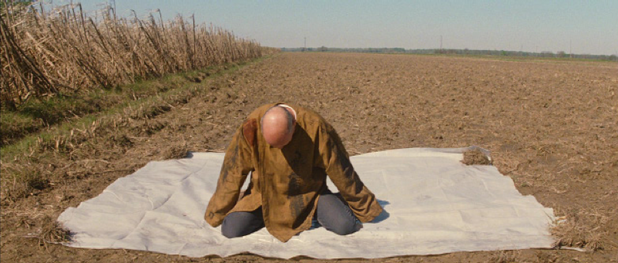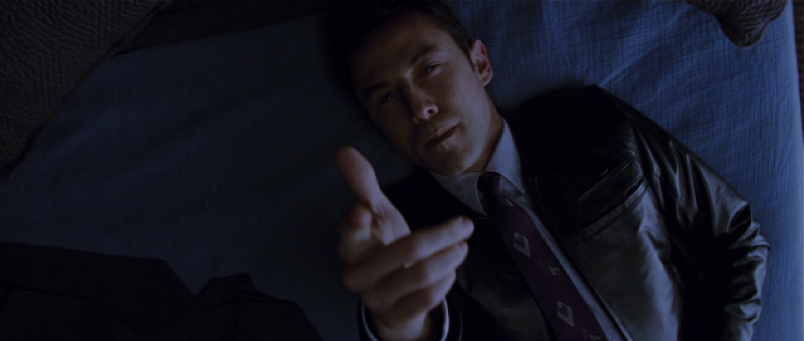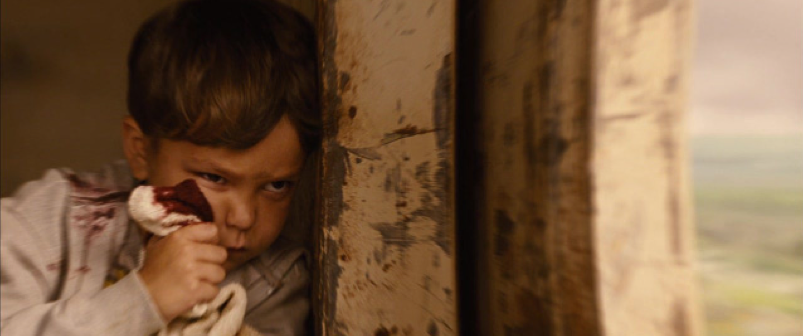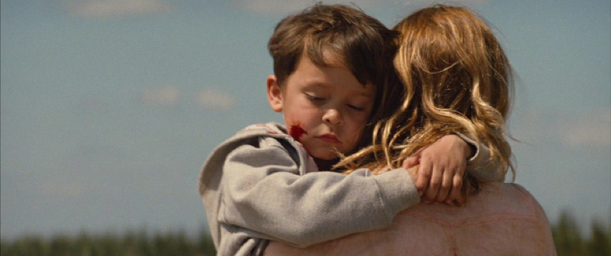Looper: Closing the Loop
By Heidi Sheppard, Nathaniel Nene Mendoza, Rebecca George, Robert Strimboulis, and William Martel
“Then I saw it, I saw a mom who would die for her son, a man who would kill for his wife, a boy, angry & alone, laid out in front of him the bad path. I saw it & the path was a circle, round & round. So I changed it...” (Johnson, Looper)
At first glance Looper (Rian Johnson, 2012) appears to be a typical science fiction film. Whether it be the floating motorbikes or the time travel, it would be easy to assume that the main purpose and drive behind Looper is merely the spectacle of the extraordinary. However, unlike many science fiction films Looper uses the genre as a vehicle allowing the audience to explore deeper psychological messages, which address what it means to be an original, and how our actions affect our future.
The central conflict in Looper is young Joseph Simmons (Joseph Gordon-Levitt) versus old Joseph Simmons (Bruce Willis). Man versus man, however, this is no ordinary man, this man is himself. One may assume this to mean good versus evil, but there is no defined right or wrong in this self versus self conflict. In fact, neither of the “Josephs” are praise-worthy men. Both are trained killers, hungry for revenge and set on accomplishing their goals, no matter what the cost. However, fundamentally their goals differ. Young Joe is trying to kill his future self in order to “regain” his life, while old Joe is on a mission to kill the Rainmaker as a child in order to reverse the timeline, and revive his dead wife. In light of the characters plights, their causes may seem justifiable, which poses a problem – with whom exactly do we sympathize?
At first glance Looper (Rian Johnson, 2012) appears to be a typical science fiction film. Whether it be the floating motorbikes or the time travel, it would be easy to assume that the main purpose and drive behind Looper is merely the spectacle of the extraordinary. However, unlike many science fiction films Looper uses the genre as a vehicle allowing the audience to explore deeper psychological messages, which address what it means to be an original, and how our actions affect our future.
The central conflict in Looper is young Joseph Simmons (Joseph Gordon-Levitt) versus old Joseph Simmons (Bruce Willis). Man versus man, however, this is no ordinary man, this man is himself. One may assume this to mean good versus evil, but there is no defined right or wrong in this self versus self conflict. In fact, neither of the “Josephs” are praise-worthy men. Both are trained killers, hungry for revenge and set on accomplishing their goals, no matter what the cost. However, fundamentally their goals differ. Young Joe is trying to kill his future self in order to “regain” his life, while old Joe is on a mission to kill the Rainmaker as a child in order to reverse the timeline, and revive his dead wife. In light of the characters plights, their causes may seem justifiable, which poses a problem – with whom exactly do we sympathize?
Throughout the film our sympathies shift between the two Joes. As the film opens we feel sympa- thy for older Joe. We follow him through his young life and watch as he ages, hates, runs, and finally finds redemptive love, only for her to be murdered by the Rainmaker. Finally, we see him fight his captors and return to the past in one last desperate hope of regaining what is lost. But despite this initial emphasis, di- rector Rian Johnson quickly shifts the focus of the story back to younger Joe, keeping him the protagonist of the film, and making him the Joe we ultimately want to succeed.
Young Joe becomes a hunted fugitive and in search of his older self, he stumbles upon the farm where a child, Cid, and his mother, Sara, live. Young Joe comes to realize that Cid is the child who will grow up to become the Rainmaker. As the story climaxes young Joe sees the threads of the timeline coming together; old Joe killing Sara, Cid enraged and becoming the Rainmaker. Young Joe realizes that the only way to end the cycle and possibly prevent Cid from becoming the Rainmaker is to kill himself and close the loop permanently.
An often-overlooked aspect of time travel is the real science aspect of it. Edward Farhi, a theoretical physicist at MIT took interest in time travel and decided to research it further. Around 1905 Albert Einstein developed the special theory of relativity that focused on traveling into the future (unlike Looper, which travels into the past.) With this in mind, Farhi began looking at time differently stating, “Einstein argued time is not an ever-flowing and immutable thing, but that an interval of time between events depends on the observer” (Pierce, 2012). Essentially, this means the faster you travel compared to another object, the slower your clock ticks relative to other objects. Einstein illustrated this by using the example of a rocket traveling close to the speed of light, which then returns to Earth months, or years later (Pierce, 2012). According to Einstein, this journey would elapse hundreds of years on earth.
Young Joe becomes a hunted fugitive and in search of his older self, he stumbles upon the farm where a child, Cid, and his mother, Sara, live. Young Joe comes to realize that Cid is the child who will grow up to become the Rainmaker. As the story climaxes young Joe sees the threads of the timeline coming together; old Joe killing Sara, Cid enraged and becoming the Rainmaker. Young Joe realizes that the only way to end the cycle and possibly prevent Cid from becoming the Rainmaker is to kill himself and close the loop permanently.
An often-overlooked aspect of time travel is the real science aspect of it. Edward Farhi, a theoretical physicist at MIT took interest in time travel and decided to research it further. Around 1905 Albert Einstein developed the special theory of relativity that focused on traveling into the future (unlike Looper, which travels into the past.) With this in mind, Farhi began looking at time differently stating, “Einstein argued time is not an ever-flowing and immutable thing, but that an interval of time between events depends on the observer” (Pierce, 2012). Essentially, this means the faster you travel compared to another object, the slower your clock ticks relative to other objects. Einstein illustrated this by using the example of a rocket traveling close to the speed of light, which then returns to Earth months, or years later (Pierce, 2012). According to Einstein, this journey would elapse hundreds of years on earth.
Scientists conclude that, “to warp space-time enough to create a closed timeline curve as well as power the spaceship would demand half of the universe’s matter and energy.” This massive amount of energy would collapse the universe before you could travel back to it. Aside from the science of the time travel, the machine itself in Looper is an unrealistic portrayal of what a time machine should theoretically look like. Farhi remarks that if someone were to construct a device powerful enough to warp space-time, it would not look like the machine portrayed in Looper, which appears to be merely a mechanic sphere draped in coils (Mosher, 2012).
For perhaps this very reason director Rian Johnson rejects the discussion of the time travel concepts at play. Instead, Johnson intends the audience to focus on the characters themselves, the choices they are presented with, and how they choose to react. For instance, in Joe’s world time travel exists, but what effect does that have on him? In reality when something bad happens, we must console ourselves by thinking, “It has happened and it cannot be changed. I must move on.” However, in Joe’s world no event is permanent and this realization factors into old Joe’s obsession with changing what has happened to the point where he is willing to murder innocent children to achieve his desperate ends. In a real world Joe would have to face the finality of death and the consequences of his choices, but the illusion of power that time travel gives makes him believe he is invincible and that loss or guilt is reversible. How else could he reconcile murdering children? He believes he can change his reality. And what of Young Joe? His entire life is spelled out for him in a job description. He is aware from the beginning that he must keep killing until his Loop is closed, at which point he will live the rest of his life knowing how he will die.
It is interesting to note that although time travel is a prominent plot device in the film Rian Johnson uses it as a device that explore the characters psyche. In an article for Popular Science, Johnson comments, “The science of real life time travel was less important than the science of using time travel in a story”, “I studied other time travel movies to see how they put it at the service of the characters and story, and not the other way around” (Mosher, 2012). Some examples of films that inspired the ideas behind Looper are Chris Marker’s classic 1962 film, La Jetée, a story about a man from a dark future going back in time to find his love and James Cameron’s film, The Terminator (1984.) Looper’s mantra is, “There’s no fate but what we make.” (a quote from the Terminator franchise), referring to the way Joe can essentially change his future by changing his past self (Mosher, 2012).
The ideas behind the time travel in Looper tribute other science fiction films aside from those that have already been mentioned. From Back to the Future, it tributes the time travel in which changes to the timeline immediately affect present time. Essentially this type of time travel is a strict progression of cause to effect and if you change any given cause it will change the coordinating effect. Therefore, if you change anything in the past your life will automatically shift to accommodate the change. We see an example of this when the Looper organization begins scarring and mutilating the young Looper, Seth, which causes his older self to receive the same scarring. The film also borrows from the idea of a “Multiverse” a common idea in many time travel stories in which every choice we make changes the world around us and for each choice we don’t make there are a thousand other parallel realities where things went slightly differently, and every- time we time travel we create a new reality. Early in the film we see young Joe kill old Joe and watch as he lives out his life aging into the old Joe that will be sent back. Old Joe comes from a different history than that of young Joe and we know that the Rainmaker is created by old Joe’s violent actions, so how can he exist in the world where young Joe was allowed to grow old? Perhaps old Joe has made the trip back, once, twice, even a thousand times, each trip creating a new dimension. It is possible that this loop would continue until Joe closed his own loop permanently by killing himself, creating yet another dimension where Cid is safe to grow up with his mother.
The ideas behind the time travel in Looper tribute other science fiction films aside from those that have already been mentioned. From Back to the Future, it tributes the time travel in which changes to the timeline immediately affect present time. Essentially this type of time travel is a strict progression of cause to effect and if you change any given cause it will change the coordinating effect. Therefore, if you change anything in the past your life will automatically shift to accommodate the change. We see an example of this when the Looper organization begins scarring and mutilating the young Looper, Seth, which causes his older self to receive the same scarring. The film also borrows from the idea of a “Multiverse” a common idea in many time travel stories in which every choice we make changes the world around us and for each choice we don’t make there are a thousand other parallel realities where things went slightly differently, and every- time we time travel we create a new reality. Early in the film we see young Joe kill old Joe and watch as he lives out his life aging into the old Joe that will be sent back. Old Joe comes from a different history than that of young Joe and we know that the Rainmaker is created by old Joe’s violent actions, so how can he exist in the world where young Joe was allowed to grow old? Perhaps old Joe has made the trip back, once, twice, even a thousand times, each trip creating a new dimension. It is possible that this loop would continue until Joe closed his own loop permanently by killing himself, creating yet another dimension where Cid is safe to grow up with his mother.
Now we must consider the matter of young Cid, the Rainmaker. We see a child who will grow up to become a ruthless mass murderer and crime lord. Due to this, old Joe decides that saving the future is worth murdering children. However, to achieve his means he kills two innocent children who are in no way involved. When young Joe decides to eliminate himself in the timeline he thwarts his future self in murdering Cid as a child. Young Joe kills himself because he believes that his future action of murdering Cid’s mother will result in Cid’s anger, and lead him to become a terrible man. By making this ultimate sacrifice Joe believes he is giving Cid an opportunity to lead a different life under his mother’s guidance and love, and a chance to grow into a better man than old Joe knows him to be.
However, through this commendable self-sacrifice Joe still leaves a perilous balance of unmade choices that could result in billions of possible lives waiting for Cid. We understand that Cid is not the most stable child, and that his mother is not perfect. Cid may grow up to be a stable man, but perhaps he will grow up into the Rainmaker, or something far more terrifying. This leads us to wonder; can we really afford the chance? Was old Joe right? Does everyone have the right to live their own lives undisturbed, despite the terrible wrongs that their existences may cause?
Through this discussion of the theories and realities within Looper it is clear that it is a film charged with thought provoking conflict and engaging science. Through the story we are morally conflicted by the option of changing the world at the cost of killing a then innocent child. We watch a man torn between the realities of what may be, and the consequences of what could be as a result of playing God. It could perhaps be argued that this is where Looper makes one of its strongest points. Given the chance would we, or rather should we, take this chance? After all, who are we to decide? Is man destined to one unchangeable future and can we justly condemn a child for crimes not yet committed, and for choices yet unmade? Or is his destiny malleable, an ever-changing reality where one single decision could mean the world?
However, through this commendable self-sacrifice Joe still leaves a perilous balance of unmade choices that could result in billions of possible lives waiting for Cid. We understand that Cid is not the most stable child, and that his mother is not perfect. Cid may grow up to be a stable man, but perhaps he will grow up into the Rainmaker, or something far more terrifying. This leads us to wonder; can we really afford the chance? Was old Joe right? Does everyone have the right to live their own lives undisturbed, despite the terrible wrongs that their existences may cause?
Through this discussion of the theories and realities within Looper it is clear that it is a film charged with thought provoking conflict and engaging science. Through the story we are morally conflicted by the option of changing the world at the cost of killing a then innocent child. We watch a man torn between the realities of what may be, and the consequences of what could be as a result of playing God. It could perhaps be argued that this is where Looper makes one of its strongest points. Given the chance would we, or rather should we, take this chance? After all, who are we to decide? Is man destined to one unchangeable future and can we justly condemn a child for crimes not yet committed, and for choices yet unmade? Or is his destiny malleable, an ever-changing reality where one single decision could mean the world?
Works Cited
“Ten Mysteries in Looper Explained by Director Rian Johnson | /Film.” /Film | Blogging the Reel World. N.p., n.d. Web. 22 Mar. 2013. <http://www.slashfilm.com/ten-mysteries-in-looper-explained-by-director-rian-johnson/>.
Abrahams, Stephanie. “Joseph Gordon-Levitt on Becoming Bruce Willis and Time-Traveling to Meet His Future Self | TIME.com.” Entertainment | What's good, bad and happening, from pop culture to high culture | TIME.com. N.p., n.d. Web. 22 Mar. 2013. <http://entertainment.time.com/2012/09/26/ joseph-gordon-levitt-on-becoming-bruce-willis-and-time-traveling-to-meet-his-future-self/>.
“Looper (Rian Johnson, USA/China, 2012) (In Memoriam Chris Marker 2) | wjrcbrown on film.” wjrcbrown on film | Blogging seriously about cinema and other things. N.p., n.d. Web. 22 Mar. 2013. <http:// wjrcbrown.wordpress.com/2012/10/02/looper-rian-johnson-usachina-2012-in-memoriam-chris- marker-2/>.
“New Infographic Illustrates A Major Flaw In Looper’s Ending - CinemaBlend.com.” CinemaBlend.com: Entertainment news and opinions you can trust. N.p., n.d. Web. 22 Mar. 2013. <http://www.cinem- ablend.com/new/Infographic-Illustrates-Major-Flaw-Looper-Ending-33458.html>.
Swartz, Aaron. “How Looper Works (Aaron Swartz’s Raw Thought).” Aaron Swartz. N.p., n.d. Web. 22 Mar. 2013. <http://www.aaronsw.com/weblog/looperexplained>.
Lussier, Germain. “Ten Mysteries in ‘Looper’ Explained by Director Rian Johnson.” /Film: Blogging the Reel World. 22 March 2013 http://www.slashfilm.com/ten-mysteries-in-looper-explained-by-director-rian- johnson/
Outlaw, Kofi. “’Looper’ Time Travel Explained.” Screen Rant. 22 March 2013 http://screenrant. com/looper-ending-explanation-time-travel-spoilers/2/
Mosher, Dave. “Looper” And The Real Science Of Time Travel.” Popular Science. N.p., 27 Sept. 2012. Web. 10 Mar. 2013. http://www.popsci.com/science/article/2012-09/emlooperem-and-real-science- time-travel
Pierce, Scott. “A Look at ‘Looper’s’ Potential for Real World Time Travel.” CNN. Cable News Network, 01 Jan. 1970. Web. 10 Mar. 2013. http://www.cnn.com/2012/10/02/showbiz/movies/looper-time- travel-pierce
Looper. Dir. Rian Johnson. Perf. Joseph Gordon Levitt, Bruce Willis. Sony Pictures Home Entertain- ment, 2012. DVD.
“Ten Mysteries in Looper Explained by Director Rian Johnson | /Film.” /Film | Blogging the Reel World. N.p., n.d. Web. 22 Mar. 2013. <http://www.slashfilm.com/ten-mysteries-in-looper-explained-by-director-rian-johnson/>.
Abrahams, Stephanie. “Joseph Gordon-Levitt on Becoming Bruce Willis and Time-Traveling to Meet His Future Self | TIME.com.” Entertainment | What's good, bad and happening, from pop culture to high culture | TIME.com. N.p., n.d. Web. 22 Mar. 2013. <http://entertainment.time.com/2012/09/26/ joseph-gordon-levitt-on-becoming-bruce-willis-and-time-traveling-to-meet-his-future-self/>.
“Looper (Rian Johnson, USA/China, 2012) (In Memoriam Chris Marker 2) | wjrcbrown on film.” wjrcbrown on film | Blogging seriously about cinema and other things. N.p., n.d. Web. 22 Mar. 2013. <http:// wjrcbrown.wordpress.com/2012/10/02/looper-rian-johnson-usachina-2012-in-memoriam-chris- marker-2/>.
“New Infographic Illustrates A Major Flaw In Looper’s Ending - CinemaBlend.com.” CinemaBlend.com: Entertainment news and opinions you can trust. N.p., n.d. Web. 22 Mar. 2013. <http://www.cinem- ablend.com/new/Infographic-Illustrates-Major-Flaw-Looper-Ending-33458.html>.
Swartz, Aaron. “How Looper Works (Aaron Swartz’s Raw Thought).” Aaron Swartz. N.p., n.d. Web. 22 Mar. 2013. <http://www.aaronsw.com/weblog/looperexplained>.
Lussier, Germain. “Ten Mysteries in ‘Looper’ Explained by Director Rian Johnson.” /Film: Blogging the Reel World. 22 March 2013 http://www.slashfilm.com/ten-mysteries-in-looper-explained-by-director-rian- johnson/
Outlaw, Kofi. “’Looper’ Time Travel Explained.” Screen Rant. 22 March 2013 http://screenrant. com/looper-ending-explanation-time-travel-spoilers/2/
Mosher, Dave. “Looper” And The Real Science Of Time Travel.” Popular Science. N.p., 27 Sept. 2012. Web. 10 Mar. 2013. http://www.popsci.com/science/article/2012-09/emlooperem-and-real-science- time-travel
Pierce, Scott. “A Look at ‘Looper’s’ Potential for Real World Time Travel.” CNN. Cable News Network, 01 Jan. 1970. Web. 10 Mar. 2013. http://www.cnn.com/2012/10/02/showbiz/movies/looper-time- travel-pierce
Looper. Dir. Rian Johnson. Perf. Joseph Gordon Levitt, Bruce Willis. Sony Pictures Home Entertain- ment, 2012. DVD.








